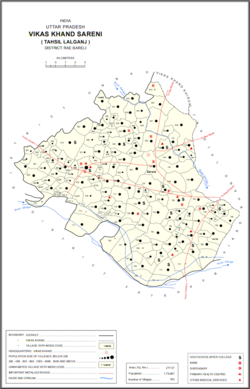Musapur, Raebareli
 From Wikipedia - Reading time: 9 min
From Wikipedia - Reading time: 9 min
Musapur
Musāpur | |
|---|---|
Village | |
 Map showing Musapur (#144789) in Sareni CD block | |
| Coordinates: 26°04′54″N 80°53′14″E / 26.081674°N 80.88716°E[1] | |
| Country | |
| State | Uttar Pradesh |
| District | Raebareli |
| Area | |
• Total | 2.92 km2 (1.13 sq mi) |
| Population (2011)[2] | |
• Total | 1,944 |
| • Density | 670/km2 (1,700/sq mi) |
| Languages | |
| • Official | Hindi |
| Time zone | UTC+5:30 (IST) |
| Vehicle registration | UP-35 |
Musapur is a village in Sareni block of Rae Bareli district, Uttar Pradesh, India.[2]
Description
[edit]Musapur is located 15 km from Lalganj, the tehsil headquarters.[3] As of 2011, it has a population of 1,944 people, in 340 households.[2] It has one primary school and no healthcare facilities.[2] It belongs to the nyaya panchayat of Sagar Khera.[4]
Census data
[edit]The 1951 census recorded Musapur as comprising 6 hamlets, with a total population of 851 people (424 male and 427 female), in 157 households and 138 physical houses.[5] The area of the village was given as 715 acres.[5] 156 residents were literate, 138 male and 18 female.[5] The village was listed as belonging to the pargana of Sareni and the thana of Sareni.[5]
The 1961 census recorded Musapur as comprising 6 hamlets, with a total population of 952 people (453 male and 499 female), in 174 households and 149 physical houses.[6] The area of the village was given as 715 acres.[6]
The 1981 census recorded Musapur as having a population of 1,163 people, in 218 households, and having an area of 292.99 hectares.[3] The main staple foods were given as wheat and rice.[3]
The 1991 census recorded Musapur as having a total population of 954 people (526 male and 428 female), in 236 households and 236 physical houses.[4] The area of the village was listed as 339 hectares.[4] Members of the 0-6 age group numbered 95, or 10% of the total; this group was 65% male (62) and 35% female (33).[4] Members of scheduled castes made up 40% of the village's population, while no members of scheduled tribes were recorded.[4] The literacy rate of the village was 48% (348 men and 108 women).[4] 349 people were classified as main workers (278 men and 81 women), while 0 people were classified as marginal workers; the remaining 605 residents were non-workers.[4] The breakdown of main workers by employment category was as follows: 137 cultivators (i.e. people who owned or leased their own land); 196 agricultural labourers (i.e. people who worked someone else's land in return for payment); 0 workers in livestock, forestry, fishing, hunting, plantations, orchards, etc.; 0 in mining and quarrying; 0 household industry workers; 0 workers employed in other manufacturing, processing, service, and repair roles; 0 construction workers; 1 employed in trade and commerce; 0 employed in transport, storage, and communications; and 15 in other services.[4]
References
[edit]- ^ "Geonames Search". Do a radial search using these coordinates here.
- ^ a b c d e "Census of India 2011: Uttar Pradesh District Census Handbook - Rae Bareli, Part A (Village and Town Directory)" (PDF). Census 2011 India. pp. 262–87. Retrieved 16 August 2021.
- ^ a b c Census 1981 Uttar Pradesh: District Census Handbook Part XIII-A: Village & Town Directory, District Rae Bareli (PDF). 1982. pp. 148–9. Retrieved 16 August 2021.
- ^ a b c d e f g h Census 1991 Series-25 Uttar Pradesh Part-XII B Village & Townwise Primary Census Abstract District Census Handbook District Raebareli (PDF). 1992. pp. xxiv–xxviii, 182–3. Retrieved 23 October 2021.
- ^ a b c d Census of India, 1951: District Census Handbook Uttar Pradesh (42 - Rae Bareli District) (PDF). Allahabad. 1955. pp. 114–5. Retrieved 23 October 2021.
{{cite book}}: CS1 maint: location missing publisher (link) - ^ a b Census 1961: District Census Handbook, Uttar Pradesh (39 - Raebareli District) (PDF). Lucknow. 1965. pp. lxxii-lxxiii of section "Dalmau Tahsil". Retrieved 16 August 2021.
{{cite book}}: CS1 maint: location missing publisher (link)
 KSF
KSF